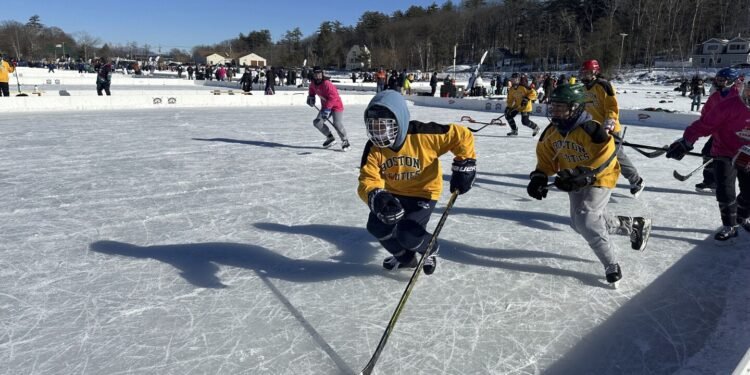MEREDITH, N.H. (news agencies) — Every winter, Pete Kibble and the guys he plays social hockey with in Massachusetts make the trek up to New Hampshire to play in an outdoor tournament many believe embodies the sport in its purest form.
They are among the 2,200 players who descend on Meredith each February to compete for three days on a frozen lake surrounded by rolling, snow-covered hills. It’s an event many wouldn’t miss as much for the social experience as anything. Kibble’s team name — Nog — even comes from their post-game tradition of sharing eggnog with opponents.
But like many winter traditions on lakes across the U.S., the Pond Hockey Classic is under threat from climate change. This year, the tournament was moved from Lake Winnipesaukee, where the ice wasn’t thick enough, to the smaller Lake Waukewan. As temperatures soared, a sister tournament on Lake Champlain in Vermont was canceled.
Elsewhere, at New York’s Saranac Lake, a palace constructed from thousands of blocks of ice was closed during the winter carnival Saturday due to safety concerns as it melted away. The same day in Maine, an 88-year-old man died when the all-terrain vehicle he was on plunged through the ice after a fishing trip, the latest in a series of such accidents.
In the Midwest, there has been a decrease in both the extent and duration of ice cover on the Great Lakes, while some smaller lakes have lost about 20 total days of annual ice cover over the past century, said Ted Ozersky, an associate professor at the University of Minnesota Duluth.
He said the rapid changes also could affect wildlife and ecosystems. “We really don’t know what this loss of winter means for our lakes,” Ozersky said.
Last year was the warmest ever recorded on Earth, and a natural El Nino weather pattern has made winter even milder in some places.
In Meredith, players traveled from around the country for the tournament that began Feb. 2. The rules were four per side with no goalies, and players ranged in ability from beginners to former professionals.



 Pakistan Rupee Exchange Rate
Pakistan Rupee Exchange Rate





